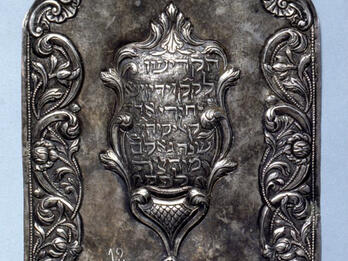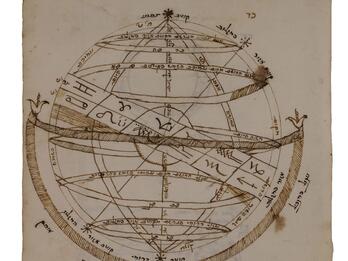Mikhtav Aḥuz (Letter of Aḥuz)
In sum, many rabbis in these times understand nothing about the spheres and their workings, just as oxen and donkeys lack understanding [see Isaiah 1:3]. They have violated laws, broken statutes, breached everlasting covenants, and rebelled against the word of His prophet, who cries out into their ears: Woe unto them who rise up early in the morning, that they may follow strong drink (Isaiah 5:11); and the harp and the psaltery, the tabret and the pipe, and wine, are in their feasts; but they regard not the work of the Lord, neither have they considered the operation of His hands (Isaiah 5:12). And it is written: Lift up your eyes on high, and see: who has created these? (Isaiah 40:26).
And now, my brother, your humility has improved me [see Psalms 18:36] and enabled me to speak with you at greater length. For this is the whole of man—when one finds a dear friend wandering in the field of books, like someone collecting herbs in a forest, unable to select the sweet from the bitter, he will direct him on a good path, and this will be enough to bring him to the life of the world to come and render him like a captain of the army over all forms of wisdom. Without the assistance of a teacher, he would be like a blind man going through a skylight [see, e.g., b. Bava Batra 12b]. How many there are who spend their days and nights pouring over books and yet lack all wisdom. For they waste their time on studies and books, but when they return to a volume that they perused a year earlier it is as though they had seen it in a dream. They are comparable to a donkey tied to a mill, which goes round and round without budging from its place. Just as every form of labor requires careful mental preparation if one wishes to succeed, so too every good book must be read from cover to cover to be understood fully. Happy is the man who listens to me; happy is his nature, for whom this is the case [see Psalms 144:15]. There is no need for the volumes of the Talmud, other than for one who wants to be called a tanna or an amora, and to earn an honest livelihood in this manner, which is the aim of all Torah scholars. However, these are of no use to masters of the Bible, all the more so midrashim and parables, which are like ants’ wings to them. Once you have removed all holy books that include such matters, you will find only a few volumes composed by those of exceptional spiritual worth [see b. Sukkah 45b], which are like fine flour. Why do you weary your poor soul with these; how then have you turned into the degenerate plant of a strange vine unto Me? (Jeremiah 2:21).
Credits
Published in: The Posen Library of Jewish Culture and Civilization, vol. 5.




